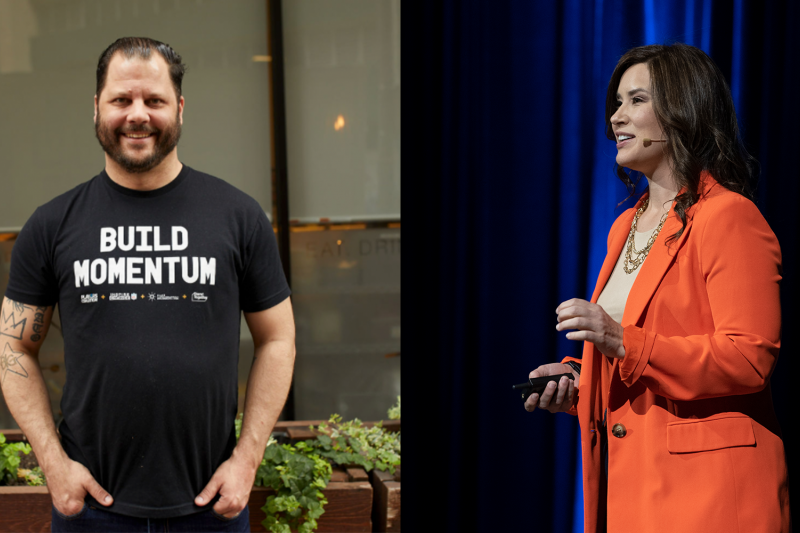Go Behind the Scenes with Our New Social Innovation Incubator

Every day, we work to drive transformative change and advance racial equity in the areas of education, income and health in North Texas. Our work in social innovation—which encourages the creation of bold new solutions that advance progress toward our impact goals—is one key to our success. Through our social innovation program, we provide the necessary resources, including funding, mentorship and connections, to entrepreneurs to assist them in the development of their innovative ventures.
To build on our impact in the social innovation space, we just launched the Social Innovation Incubator, developed in partnership with Bridge for Billions. This leadership development program is specifically geared to social ventures led by women and people of color and aims to address historical opportunity and resource gaps, plus systemic racial and gender inequities that exist throughout the region.
Here, we chat with Alexis Snow, senior manager of innovation, and Jamey Applegate, MSW, senior director of innovation, about the new program, their take on the progress being made in social innovation, and what the future holds.
WHY IS SOCIAL INNOVATION IMPORTANT FOR MAKING PROGRESS ON OUR ASPIRE UNITED 2030 GOALS FOR NORTH TEXAS?
JAMEY APPLEGATE: It’s critical both from an impact and an equity standpoint. From the impact side, we have incredible organizations that have been making an impact for decades, and we will continue to rely on them to support the community. But it is necessary to complement those efforts by both identifying potential new solutions to pressing problems and by encouraging those established organizations to think differently. We need to constantly ask if there are new ways we could be achieving our goals. From an equity standpoint, we have an obligation to create space for voices and ideas and solutions from individuals and communities that have been historically marginalized and silenced, especially those that are closest to the problem, as they are best positioned to identify the most effective solutions.
ALEXIS SNOW: At United Way, we have goals that are aspirational in that they will require intentional, advancing solutions to the problems that face North Texans in education, income and health. Innovative approaches to these problems are important because they will allow United Way to not only be a part of the driving force for impact, but they will also fuel more effective, efficient, sustainable and just solutions across North Texas.
WHAT IS THE SOCIAL INNOVATION INCUBATOR?
JAMEY: The United Way Social Innovation Incubator is designed to address historical opportunity and resource gaps, as well as systemic racial and gender inequities, in the social innovation sector in North Texas. It will provide a 12-week organizational and leadership development program exclusively for early-stage social ventures led and staffed by women and people of color who are working to implement new and creative solutions to pressing problems facing North Texans in the areas of education, income and health.
WHO ARE SOME OF THE MOST INSPIRING SOCIAL ENTREPRENEURS YOU’VE WORKED WITH?
JAMEY: We have been incredibly lucky to have the opportunity to support so many inspiring social entrepreneurs—and I think all of the organizations we’ve had join our programs are inspiring, both in the work they do and in their vision to think differently about how to make the world better. A few that stick in my head: Steve Wanta and the team at Just Community provide financial capital, build community and offer peer coaching to Latina women who are working to build a business or build their credit. They’re incredible, and they were a finalist for the $10 million Lone Star Prize. Taylor Willis and Vanessa Barker founded The Welman Project to build on their love for creative reuse, taking surplus corporate office items, figuring out how they might be used in an educational context, and then getting those items into the hands of teachers at no cost, all of which reduces waste and reduces the burden put on teachers to buy their own materials. Finally, one of our current Social Innovation Accelerator Fellows is Cece Rockwell from BT Foundry, a nonprofit that provides training and apprenticeships in marketing and advertising, with a focus on individuals from historically marginalized communities. I was also incredibly inspired by the applications we received for our new Social Innovation Incubator, and I can’t wait to get to know our first cohort of 20 social entrepreneurs.
ALEXIS: I would agree with Jamey that all the organizations we have had a chance to work with are inspiring, as we have seen a wide array of social impact organizations come through our programming. I am constantly inspired by the missions and passion displayed by the humble leaders who desire to make a difference in the lives of others. A few names to look out for, [before we] announce our cohort of Social Innovation Incubator participants: MEE, where Sarah Robertson has co-founded a program to educate and empower youth to explore career paths and set intentional goals through diverse experiences in their local cities. TMJ Dance Project, where Terrance Johnson is on a mission to create cultural dance experiences that promote community outreach, art in education, affordable dance training and the experience of live dance performances to historically underserved communities. Last but certainly not least, Feed Oak Cliff is a part of this year’s Social Innovation Accelerator, where founder Anga Sanders has worked tirelessly to address the food desert that sweeps Southern Dallas by creating a plan to build a community-run grocery store that will fuel, feed and fight the negative health outcomes that are a direct result of lack of access to fresh produce and healthy food options in the Southern sector.
WHAT ARE THE BENEFITS OF PARTNERING WITH SMALL ORGANIZATIONS?
JAMEY: There are many benefits: 1) They’re often a little more nimble, more able to quickly assess the landscape and make critical adjustments to their models to be most effective; 2) they’re scrappy and hungry, and they go after every connection, opportunity and experience to build and grow their venture; and 3) they’re usually early in their organizational life, and we are positioned well to help them ensure they have a strong foundation that will allow for continued growth and scaling.
ALEXIS: I love working with small organizations because they are embedded in the work. My career started with grassroots service, and it’s so rewarding to know that the capacity-building curriculum that we provide to these social entrepreneurs will move their mission forward without delay. Because they are the decision-makers and they get excited to learn new skills and implement them to improve their organizational infrastructure and sustainability.
WHAT IS EQUITY IN SOCIAL INNOVATION?
JAMEY: Equity in social innovation is two-fold: It’s about ensuring that social innovation is used as a force for creating a more equitable society, and it’s about ensuring that social innovation and social innovation programming are pursued with equity as a primary goal. It’s helping social entrepreneurs develop clear policies, practices and programs that serve to dismantle systems of oppression and center diversity, equity, inclusion and representation both internally and in the community. And it’s doing our own work to make sure that our social innovation programs are accessible, inclusive and culturally relevant and that our staff, stakeholders and program participants are representative of the communities we serve.
WHAT’S ON THE HORIZON FOR SOCIAL INNOVATION IN NORTH TEXAS?
ALEXIS: One of the biggest things is continuing to see social innovation as a critical component to making sustained progress on our toughest challenges—that investing in new and creative solutions can and does lead to real breakthroughs. And a huge trend is seeing innovation as a key value for all North Texas nonprofits, ensuring that they are always thinking about how to make their work more effective, efficient, sustainable and just. I think social innovation is going to become the de facto innovation model, and that innovation only makes sense if it has a social mission and benefits the community at large.
Be part of the change today. Donate, volunteer or sign up for advocacy alerts.



